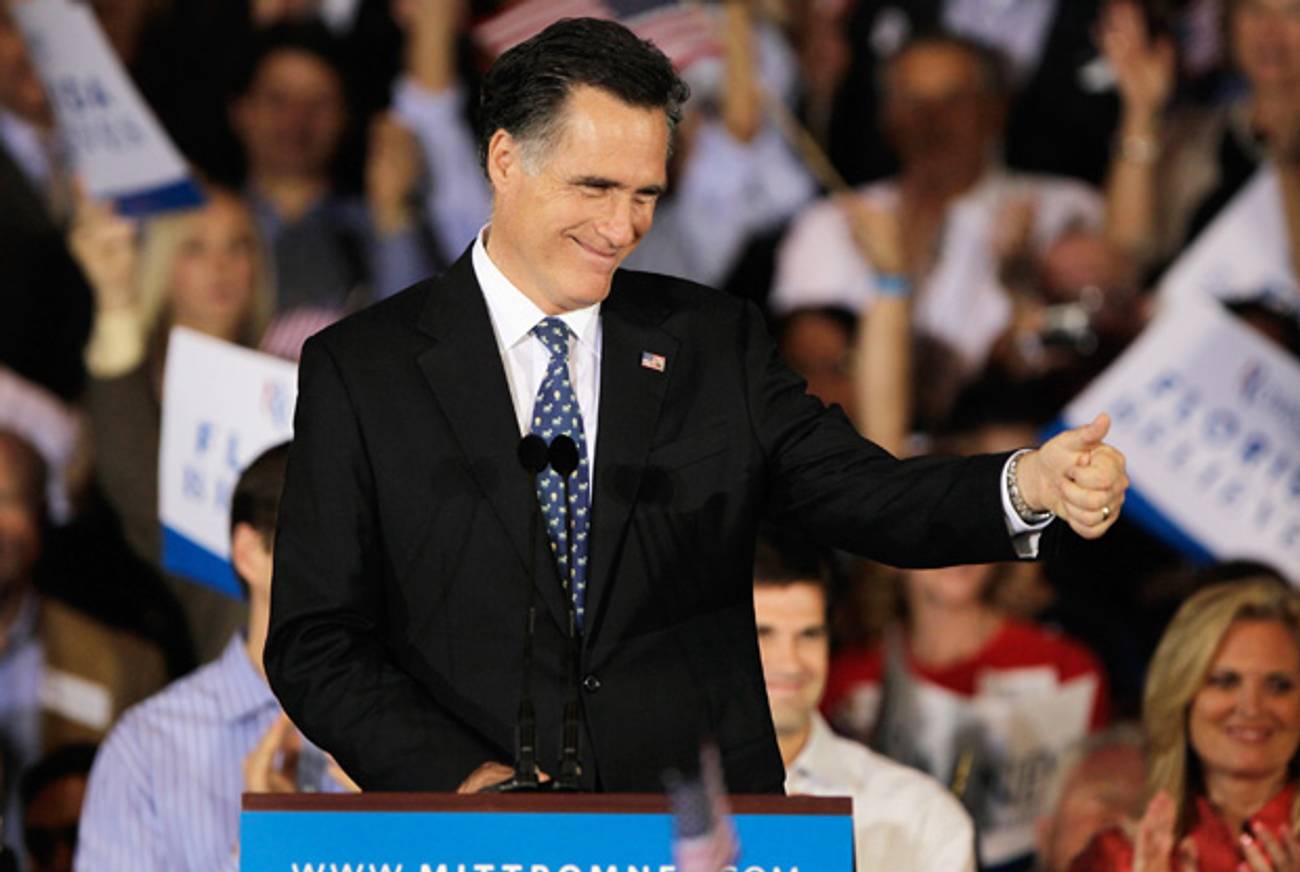Florida Goes For Romney; Did Boca Show Up?
A smaller percentage of the GOP electorate was Jewish than in 2008




Congratulations to Mitt Romney, who won the Florida primary going away. I would bet that last night will be viewed in retrospect as the evening Romney locked up the Republican nomination (it is already the night that got him Secret Service protection). He trounced runner-up Newt Gingrich by double digits and attracted nearly the majority of the votes among four candidates (the other two being Rick Santorum and Ron Paul) by outspending Gingrich, having a superior organization and battle plan, and significantly besting him in the most recent debate. The exit polls tell a tale of dominance—Romney won among men and women; the least-educated, the most-educated, and everyone in between; the poor, the rich, and everyone in between—and of pragmatism: while Gingrich captured the most voters identifying as “very conservative,” Romney won an outright majority of voters who said “Can Defeat Obama” was the most important quality to them (he also won among those who said, “Strong Moral Character,” an astounding eight percent of whom voted for Gingrich).
But why talk about this stuff when we can talk about the Jews?!
Polling pundit extraordinaire Nate Silver noted early on last evening that Jewish turnout was low last night in comparison to the primary four years ago: in 2008, three percent of GOP primary voters identified as Jewish; last night, only one percent did. This, Silver concluded, “might mean that Jewish Republican voters in the state are not terribly enthusiastic about this group of candidates.” The line was pondered. On Twitter, the battle was joined. (Pssst, Gal: don’t engage him! He’s very good!) At Commentary, Jonathan Tobin responded. The explanation? The Rudy phenomenon: “the man who drove that mini-surge in Jewish Republican voters was Rudy Giuliani,” argued Tobin. “Though he flopped in the Florida primary four years ago, the former mayor of New York was a big favorite of the Jewish and pro-Israel community.”
I don’t know if that carries water. We don’t know for sure who won Florida’s Republican Jewish vote, either last night or in 2008—the overall Jewish franchise was unfortunately not large enough for exit pollsters to glean meaningful data from it. (Maybe the best we can do is to look at the extremely Jewish counties of Palm Beach and Broward, where Giuliani got 19 and 17 percent of the vote, besting only slightly his 15 percent statewide figure; he did put up a slightly more impressive 26 percent in Jewish-but-also-idiosyncratic Miami-Dade.) Even granting a Giuliani Bump, Tobin is suggesting that Giuliani was single-handedly able to increase the percentage of the Jewish vote—by a factor of three!—in an electorate roughly the same size as last night’s (about 1.9 million voted in the 2008 primary; it looks like about 1.75 million voted in last night’s). That seems pretty far-fetched to me, especially when you remember that Florida’s is a closed primary, open only to registered Republicans, so Giuliani could not have drawn Democratic and independent Jews in to vote for him (and when you remember, as Shmuel Rosner reminds us, that Sen. Joe Lieberman had endorsed John McCain). It’s roughly as plausible to suggest that Jewish turnout was depressed because Jews were going to go for Romney until they heard a disembodied voice on the phone tell them the former Massachusetts governor hates kosher-keeping Holocaust survivors. It didn’t play no role, it’s not impossible it played a huge role, and nobody can prove it either way. But it’s very unlikely.
The Forward’s Josh Nathan-Kazis tentatively concurred with Silver’s suggestion: “Fewer Jewish voters in the primary,” he wrote, “could correlate to a lack of enthusiasm among Jews for the Republican field.” Unlike the rest of us, Josh was down there reporting on this, so I’m more inclined to listen to him. But I’m still not going to put too much stock into the three-versus-one-percent dynamic. Most likely, it’s a combination of lack of enthusiasm among Jews, statistical noise, and a generally less excited Republican primary electorate (and one where those most excited—in the Tea Party—tend not to be Jewish).
But this does leave an open question regarding Tobin’s argument. He contends that it is possible to acknowledge that the Jewish vote changed while explaining it not by reference to larger trends or specifically Jewish or Israel-related policies or platforms or records, but, rather, to the arbitrary inflation (“mini-surge”) caused by an anomaly (in this case, the unusual presence of a moderate, ethnic, strong-on-Israel former New York City mayor from Brooklyn on the 2008 Republican ticket). I completely agree. In fact, I and many others have long suggested that while it’s certainly possible that in November President Obama will see a drop in Jewish support, that drop needs to be more than a couple points to be significant because the 78 percent of the Jewish vote he captured in 2008—higher than John Kerry’s 74 percent in 2004—was anomalously high due to the decisive nature of Obama’s victory generally as well as Jews’ “hatred” for a certain member of the Republican ticket. Given Tobin’s sensible sympathy to such external whims’ influence on voting figures, I assume that he will take all of this into account when he analyzes the returns in November. I won’t say one percent is small; he shouldn’t say 74 percent is.
Romney Wins Big in Florida Primary, Regaining Momentum [NYT]
Jewish Turnout Low in Florida [NYT FiveThirtyEight]
Low Jewish Turnout in Florida Doesn’t Help Obama in November [Commentary Contentions]
Florida Exit Polls Suggest Fewer Jews Vote GOP [Forward]
Marc Tracy is a staff writer at The New Republic, and was previously a staff writer at Tablet. He tweets @marcatracy.